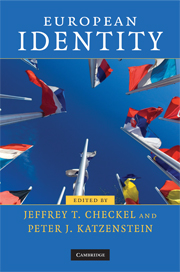1 - The politicization of European identities
Published online by Cambridge University Press: 05 June 2012
Summary
The ship of European identity has entered uncharted waters. Its sails are flapping in a stiff breeze. Beyond the harbor, whitecaps are signaling stormy weather ahead. The crew is fully assembled, but some members are grumbling – loudly. While food and drink are plentiful, maps and binoculars are missing. Officers are vying for rank and position as no captain is in sight. Sensing a lack of direction and brooding bad weather, some passengers are resting in the fading sun on easy chairs thinking of past accomplishments; others are huddling in an openly defiant mood close to the lifeboats, anticipating bad times ahead. With the journey's destination unknown, the trip ahead seems excruciatingly difficult to some, positively dangerous to others. Anxiety and uncertainty, not hope and self-confidence, define the moment.
Many European elites, deeply committed to the European Union (EU) as a political project, might reject the vignette we sketch above. They see the EU as institutional machinery for the solution of problems that in the past had shattered peace, destroyed prosperity, and otherwise proven to be intractable for national governments. For them, it is a project rooted in the European Enlightenment, and an emphatic way of saying “never again” to the disastrous wars of the twentieth century. While the Union has not yet succeeded in crafting a common European sense of “who we are,” time is on its side.
- Type
- Chapter
- Information
- European Identity , pp. 1 - 26Publisher: Cambridge University PressPrint publication year: 2009
- 41
- Cited by

